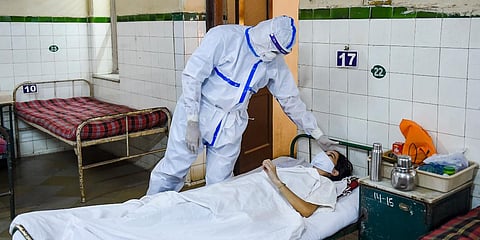

MUMBAI: The mask digs deep furrows into his face, the shield fogs up his glasses and the PPE suit weighs him down in the humidity.
The hours run into one another, uncomfortable and difficult at various levels, but it's all in a day's work for Dr Amol Pawar.
As the second wave of the pandemic ravages large parts of India, it's about sweat and tears - quite literally - for millions of healthcare workers at the frontline of the war against COVID-19.
They have walked the tightrope between looking after patients and trying to dodge infection for more than a year.
And it isn't ending anytime soon.
Pawar, obstetrician and gynaecologist at the Nowrosjee Wadia Maternity Hospital in Mumbai's Parel locality, is but one face of India's gravest health crisis yet.
Sometimes gently cradling a newborn baby and comforting a patient and other times conferring with colleagues on a particularly difficult case or counselling relatives, the 44-year-old is a familiar figure for regulars at the 450-bed hospital.
There are 35 beds in the Covid ward and 15 in the isolation ward.
Hundreds of Covid patients have passed through the maternity hospital, which had to include a Covid ward last year in May when cases began rising.
"The first case came in mid-April but we transferred the case to the Nair hospital nearby as there were no facilities in our hospital. On May 10, we started a COVID-19 ward. Since then, we've seen around 513 cases in this hospital," Pawar told PTI.
Working at least eight hours a day, six days a week and on call 24X7, he wears his discomfort and his responsibilities lightly.
"The eight hours are really packed at the hospital new admissions, discharges, rounds and monitoring medicines for patients, and now even the vaccination drive. We have to do all this while ensuring we don't contract the virus," he said.
In September last year, he did.
He was admitted to the Seven Hills hospital in Andheri and was there for three weeks.
He was on oxygen support for four days and after that got back to work through calls and guidance to his assistant.
Pawar, like many of his colleagues, has now been vaccinated.
But doctors don't have the luxury of work-from-home and have to come to work every day.
With reports of mutant strains, the tension of the infection is ever present, even for those like Pawar who have had the infection and been inoculated.
The day begins with rounds, checking up on patients, visiting the vaccination centre and recording the doses used and stocks left.
Sometimes, he lectures students over Zoom as well.
In what would a year ago be a scene from some imagined reality or a futuristic sci-fi film and is now par for the course, he and his colleagues don PPE suits, masks and shields for much of the workday.
Pawar, like the others, wears the PPE kit over his scrubs for more than three-four hours at a time.
"We can't eat, drink or use the restroom as long as we are wearing it. Add to that the irritation caused by sweat and glasses fogging up," he said.
Watching the coronavirus infection extract its toll on the country, the city and his own patients has been emotionally and physically exhausting and challenging.
But also rewarding when patients get well and return home.
"Even if we still have a long way to go in the battle against COVID-19, the gratitude on the faces of those leaving the hospital keeps us going," said Pawar.
"It's depressing for us doctors to still see that some people are still not following safety precautions. We don't want to see a rise in the number of patients anymore," he said.
Before the second wave, Wadia Hospital saw only about four to five COVID-19 cases a day.
But the numbers spiked this March.
"Suddenly in March, there were as many as 52 cases. In April, we had 78 cases. Therefore, we were forced to cancel the study leaves of our resident medical officers (RMOs), some whom have to study in the restroom because their exams are in June," he said.
In addition to his regular duties, Pawar is also the nodal officer of the Covid Vaccination Centre at Wadia.
He is involved with procuring, implementing and monitoring of the vaccination programme for COVID-19.
Sometimes, in between his various responsibilities of dealing with deliveries, obstetric complications, Covid complexities and updating his case sheets, Pawar takes a short break.
And then, when the work day ends he heads home to Thane, 26 km away.
There have been days he has to drive back to the hospital in case of an emergency.
Otherwise, it's an evening spent at home before duty beckons again the next morning.
Though Mumbai's cases have dipped in the last few days, Covid cases continue their relentless rise.
On Saturday, India recorded 4,187 fatalities and 4.01 lakh cases.
Clearly, for Pawar and other healthcare workers across the country, there is no getting off the Covid treadmill yet.